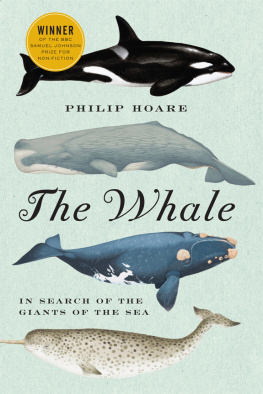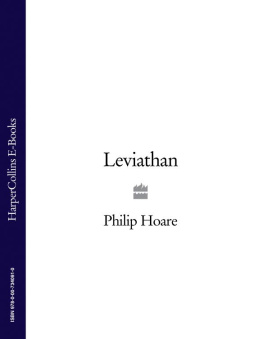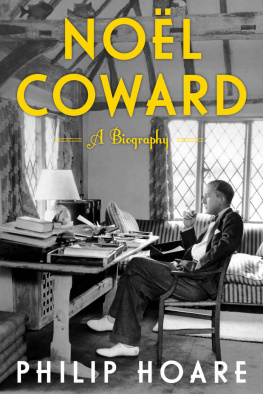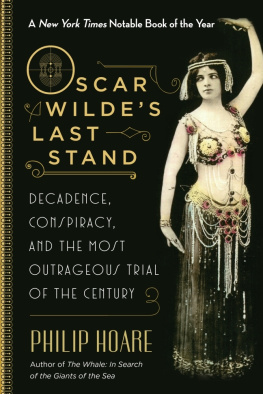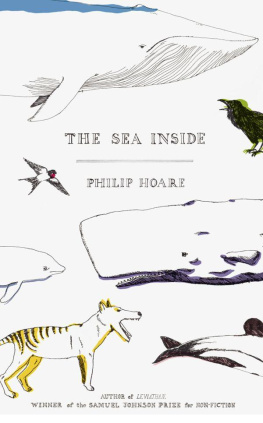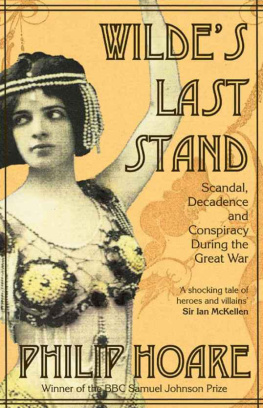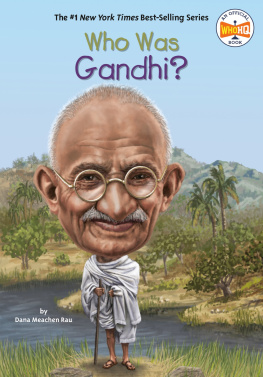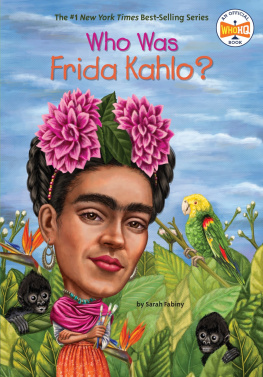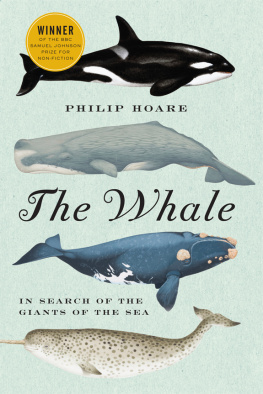Philip Hoare - The Whale: In Search of the Giants of the Sea
Here you can read online Philip Hoare - The Whale: In Search of the Giants of the Sea full text of the book (entire story) in english for free. Download pdf and epub, get meaning, cover and reviews about this ebook. year: 2010, publisher: Ecco, genre: Detective and thriller. Description of the work, (preface) as well as reviews are available. Best literature library LitArk.com created for fans of good reading and offers a wide selection of genres:
Romance novel
Science fiction
Adventure
Detective
Science
History
Home and family
Prose
Art
Politics
Computer
Non-fiction
Religion
Business
Children
Humor
Choose a favorite category and find really read worthwhile books. Enjoy immersion in the world of imagination, feel the emotions of the characters or learn something new for yourself, make an fascinating discovery.
- Book:The Whale: In Search of the Giants of the Sea
- Author:
- Publisher:Ecco
- Genre:
- Year:2010
- Rating:3 / 5
- Favourites:Add to favourites
- Your mark:
- 60
- 1
- 2
- 3
- 4
- 5
The Whale: In Search of the Giants of the Sea: summary, description and annotation
We offer to read an annotation, description, summary or preface (depends on what the author of the book "The Whale: In Search of the Giants of the Sea" wrote himself). If you haven't found the necessary information about the book — write in the comments, we will try to find it.
The Whale: In Search of the Giants of the Sea — read online for free the complete book (whole text) full work
Below is the text of the book, divided by pages. System saving the place of the last page read, allows you to conveniently read the book "The Whale: In Search of the Giants of the Sea" online for free, without having to search again every time where you left off. Put a bookmark, and you can go to the page where you finished reading at any time.
Font size:
Interval:
Bookmark:
For Theresa
There Leviathan,
Hugest of living creatures, on the deep
Stretchd like a promontory sleeps or swims,
And seems a moving land; and at his gills
Draws in, and at his breath spouts out a sea.
John Milton, Paradise Lost , quoted in title page to the first, English edition of Moby-Dick

For thou didst cast me into the deep,
Into the heart of the seas,
And the flood was round about me;
All thy waves and billows passed over me.
Jonah 2:3
Perhaps it is because I was nearly born underwater.
A day or so before my mother was due to give birth to me, she and my father visited Portsmouths naval dockyard, where they were taken on a tour of a submarine. As she climbed down into its interior, my mother began to feel labour pains. For a moment, it seemed as though I was about to appear below the waterline; but it was back in our Victorian semi-detached house in Southampton, with its servants bell-pulls still in place and its dark teak staircase turning on itself, that I was born.
I have always been afraid of deep water. Even bathtime had its terrors for me (although I was by no means a timid child) when I thought of the stories my mother told of her own childhood, and how my grandfather had painted a whale on the outside of their enamel bathtub. It was an image bound up in other childish fears and fascinations, ready to emerge out of the depths like the giant squid in the film of Twenty Thousand Leagues Under the Sea , with its bug-eyed Nautilus, Kirk Douglass tousled blond locks and stripy T-shirt, and its futuristic divers walking the ocean floor as they might stroll along the beach.
I thought, too, of my favourite seaside toya grey plastic diver which dangled in the water by a thin red tube through which you blew to make it bob to the surface, trailing little silver bubblesbut which also reminded me of those nineteenth-century explorers enclosed in faceless helmets and rubberized overalls, their feet anchored by lead boots. And in my childrens encyclopdia, I read about the pressurized bathysphere, an iron lung-like cell in which men descended to the Marianas Trench, where translucent angler fish lured their prey with luminous growths suspended in front of their gaping, devilish jaws. I was so scared of these monsters that I couldnt even touch the pages on which the pictures were printed, and had to turn them by their corners.

Southamptons municipal swimming baths, with their verdigris roof and glass windows, were a place of public exposure and weekly torture on our school trips there. Ordered to undress, revealing chicken flesh and, on older boys, dark sprouting hair, we shivered in ill-fitting trunks as we stood on wet tiles which, I was told, could harbour all sorts of disease. Padding out into the echoing arena where weak winter sun threw mocking ripples on the ceiling, we lined up to plunge in the shallow end, ordered into the water by our PE master, a wiry-haired man with an imperious whistle on a cord around his neck.
Once in, we were told to hold the hand-rail and kick away with our feet. With my fingertips turning blue with the cold and my tenacious grip, I created enough white water to seem proportionate to my effort, although it was really an endeavour to disguise my ineptitude. Then we took a polystyrene float, crumbling at the edges like stale bread, and were instructed to launch ourselves across. The far side was as unattainable as Australia to me, and the reward for successa piece of braid to sew on ones trunkswas a trophy I was as likely to win as an Olympic medal.
I never did learn to swim. The barked instructions, the fear of sinking to the tiled bottom along with the old sticking-plasters and hair-balls, combined to create an unconquerable anxiety. I somehow associated swimming not with pleasure, but with institutions, hospitals, conscription and war, with being ordered to do things I didnt want to do. At the beach Id make my excuses when my friends ran into the sea, pretending I had a cold. Throughout my childhood and my teenage years, I lived with this disability; I even came to celebrate it, perversely, as a strength.
It was only later, living alone in London in my mid-twenties, that I decided to teach myself to swim. In the chilly East End pool, built between the wars, I discovered that the water could bear up my body. I realized what I had been missing: the buoyancy of myself. It was not a question of exercise: rather, it was the idea of going out of my depth, allowing something else to take account for my physical presence in the world; being part of it, and apart from it at the same time. In a way, it was a conscious reinvention, a means of confronting my fears.
For the poet Algernon Swinburne, the sea was a sensuous vice, one that he revealed in his only novel, Lesbia Brandon , set in his childhood home on the southern coast of the Isle of Wight, with its dramatic rocky cliffs overlooking the waters of the English Channel. In the booknot published until 1950, forty years after Swinburnes deathits young hero, Herbert, learns to love the water: all the sounds of the sea rang through him, all its airs and lights breathed and shone upon him: he felt land-sick when out of the seas sight, and twice alive when hard by it. He even dares the waves like a young sea-beastpressed up against their soft fierce bosoms and fought for their sharp embraces; grappled with them as lover with lover.
Swinburne, the son of an admiral, had a picturesque beach from which to swim; I grew up in a suburb on the other side of the Solenta place of working docks and cranes and shipyards, close to which my father worked in a cable factory, testing huge insulated telecommunication lines which ran along the Atlantic sea-bed, as if tethering England to America. From my box bedroom at the back of the house I could hear the ships horns on foggy mornings; at night, clanking dredgers gouged out a route for the huge liners and container ships that ply Southampton Water. Here, the sea represents commerce, rather than recreation. A port is a restless place, a place of transit, rather than a place in itself. Here, everything orientates itself towards the watereven the area in which I lived, Sholing, was a corruption of Shore Landyet at the same time the city seemed to ignore it, as if it and the element that is the reason for its existence were two entirely separate entities.
I think differently about the water now. Every day that I can, I swim in the sea. I feel claustrophobic if I am far from the water; summer and winter, I plan my time around the tides. Sitting on the shingly beach, I watch the ferries pass each other, briefly joining superstructures before they part again, caught between somewhere and nowhere. Pushing out into the same waters that so excited the red-haired poet and bore up his pale, freckled body, I lie on my back, on a level with the land, letting the waves wash over me like a quilt. Unencumbered, unobserved, in the warm waters of late August or in the icy rough seas of December, I am buoyed up, suspended, watching the world recede along with my clothes on the beach.
Sometimes something gelatinous will brush against my legone of the cuttlefish that are often cast up on the shore, their mottled flesh, hard parrot beaks and slimy tentacles rotting away to reveal the chalk-white bone below. Sometimes Ill feel a sharp sting after an encounter with an unseen jellyfish. Yet I still go out of my depth, where no one can find me, where terns dive and cormorants bob, and where I have no knowledge of what lies below. I dream of bodies underwater, veiled yet animate, like the drowned woman in the lake in The Night of the Hunter , or the shark I thought I once saw in a Cornish cove from the top of a cliff. The way the water both reveals and conceals still disturbs me. It is a deceptive and heartless lover.
Next pageFont size:
Interval:
Bookmark:
Similar books «The Whale: In Search of the Giants of the Sea»
Look at similar books to The Whale: In Search of the Giants of the Sea. We have selected literature similar in name and meaning in the hope of providing readers with more options to find new, interesting, not yet read works.
Discussion, reviews of the book The Whale: In Search of the Giants of the Sea and just readers' own opinions. Leave your comments, write what you think about the work, its meaning or the main characters. Specify what exactly you liked and what you didn't like, and why you think so.

